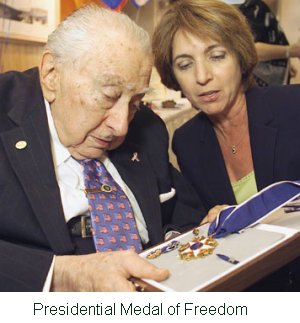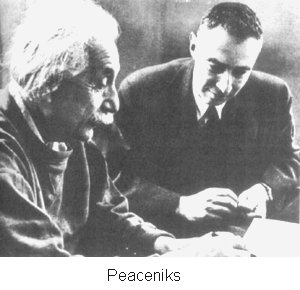


¶ Why do we weep for beauty, not laugh?

¶ As memoirs by both Kissinger and Nixon show, neither man understood why the White House could not do what it wanted. –Seymour Hersh, New Yorker, June 13-20 ’05, 66.
¶ The world simply must not go on living in fear of the terrible consequences of nuclear war. –Dwight Eisenhower to Lewis Strauss (nuclear adviser)--Peter Goodchild, Edward Teller, 219.
¶ 'In the years since the demise of the Soviet empire, Russian archival documents have compelled historians to rethink basic assumptions about the early cold war. The “enemy archives,” as the historian Melvyn Leffler has written [“Inside Enemy Archives,” Foreign Affairs, Summer 1996], demonstrate that the Soviets “did not have pre-conceived plans to make Eastern Europe communist, to support the Chinese communists, or to wage war in Korea.” Stalin had no “master plan” for Germany, and wished to avoid military conflict with the United States. . . .George F. Kennan later wrote that he “never believed that [the Soviets] have seen it in their interest to overrun Western Europe militarily, or that they would have launched an attack on that region generally even if the so-called nuclear deterrent had not existed.” . . . Both Malenkov and Khruschev also had a sound appreciation for the inherent dangers of a nuclear arms race. Malenkov . . . stunned the Politburo in 1954 with a speech in which he said that the use of the hydrogen bomb in war “would mean the destruction of world civilization.” [Khruschchev] pursued the kind of foreign policy that would later become associated with détente, and even exhibited the first glimmers of glasnost. He renewed arms control talks with the West in 1955 and by the end of the 1950’s he had sharply cut the Soviet defense budget. After receiving his first briefing on nuclear weapons in September 1953, Khruschchev later recalled, “I couldn’t sleep for several days, Then I became convinced that we could never possibly use these weapons.” ' --Kai Bird and Martin J. Sherwin, American Prometheus, 452.
When the Manhattan Project began, Edward Teller realized almost immediately (as Enrico Fermi well knew) that a fusion reaction could make an immensely bigger bang than the fission bomb then projected, and started a campaign to beat Stalin to it. His and his pet hawks' scorn for Oppenheimer's anguished pacifism eventually barred Oppenheimer from policymaking, and Elugelab Island disappeared.
Were Oppenheimer and the nuclear idealists right? Could the world have renounced superweapons in the early fifties?


A number of years ago, at a summer Fulbright conference in Berlin on recent German affairs, a young UN parliamentarian addressing our group suggested such a thing. I asked him to give us an example of a weapon that people everywhere simply agreed not to use. He did no better than you will now. Name a developing country that isn't beavering away at something to convert it, like the evil fairy's kiss, into a superpower. We don't renounce weapons. We obsolesce them with worse. Lewis Thomas, you know, said nations are crazy, just like some people: For total greed, rapacity, heartlessness, and irresponsibility there is nothing to match a nation. Nations, by law, are solitary, self-centered, withdrawn into themselves. There is no such thing as affection between nations, and certainly no nation ever loved another. They bawl insults from their doorsteps, defecate into whole oceans, snatch all the food, survive by devastation, take joy in the bad luck of others, celebrate the death of others, live for the death of others. . . .We haven’t yet learned how to stay human when assembled in masses. . . .Nations themselves have become too frightening to think about. --The Lives of a Cell, 109-110. Perhaps, though I scarcely dare to hope it, the hydrogen bomb will terrify mankind into sanity and tolerance. If this should happen we shall have reason to bless its inventors.--Bertrand Russell, Unpopular Essays (1950), 165. It hasn't happened yet, and nations are worse psychopaths than ever.
¶ 
 Cut up onions, scallions, tomato, lettuce, avocados, whatever, and lots of cheese (Tillamook Special Reserve Extra Sharp Cheddar, of course). Lay out with corn chips, jalapeños, and sour cream. Now get this: let the kids and guests build and microwave each their own. You're for World Peace, aren't you? Yo, me too. Serve with cold beer--NZ Steinlager is good (I drank it all while trying to write this accursed HTML. All I had left for the photo was Columbia Valley Hogue Dry White). Put on some Bach too--the Boston Baroque don't mistake the Brandenburgs (Telarc CD-80368) for Beethoven. All authentic Tejicano.
Cut up onions, scallions, tomato, lettuce, avocados, whatever, and lots of cheese (Tillamook Special Reserve Extra Sharp Cheddar, of course). Lay out with corn chips, jalapeños, and sour cream. Now get this: let the kids and guests build and microwave each their own. You're for World Peace, aren't you? Yo, me too. Serve with cold beer--NZ Steinlager is good (I drank it all while trying to write this accursed HTML. All I had left for the photo was Columbia Valley Hogue Dry White). Put on some Bach too--the Boston Baroque don't mistake the Brandenburgs (Telarc CD-80368) for Beethoven. All authentic Tejicano.
¶ It’s been years now since I and my stepson, then about 10, passed this billboard. ¶ We can't, you know, let sex, the bare truth, run around with no clothes on. Unless you happen to be  “Lee,” he said, all innocent, “what’s porn?” I got a little firmer grip on the steering wheel. Okay, play it straight. “It’s pictures or stories that are supposed to get you sexually excited.” He wilted a bit, not his normal deep-drilling style. U’oh. Textbook fathering. After some cautious comparative anatomy, I had no safe exit left. Whatthehell. All engines full ahead. “When the man’s penis gets stiff, he puts it into the special pocket the woman has there between her legs. And this is the secret nobody will tell you—it feels wonderful.” With a horrified look, he shot me down: “How to you get it off?”
“Lee,” he said, all innocent, “what’s porn?” I got a little firmer grip on the steering wheel. Okay, play it straight. “It’s pictures or stories that are supposed to get you sexually excited.” He wilted a bit, not his normal deep-drilling style. U’oh. Textbook fathering. After some cautious comparative anatomy, I had no safe exit left. Whatthehell. All engines full ahead. “When the man’s penis gets stiff, he puts it into the special pocket the woman has there between her legs. And this is the secret nobody will tell you—it feels wonderful.” With a horrified look, he shot me down: “How to you get it off?”

¶ England, like the United States, is generally contradictory about sex. After several hours poring over Victorian flagellation erotica, I stopped at a small pharmacy near Russell Square. There was the Daily Sport, with its ads for sex phone lines. . ., videos, sex dolls, and vibrators, and, surprisingly, for an inflatable sheep. But England is also a monarchy. Paul Cross, a longtime British Librarian, writes that the Private Case is not the only collection of hidden books in the British Library. There is also a collection labelled S.S., or Suppressed Safe. S.S. books are subversive, to “the throne, of religion, or of propriety.” They are considered the worst books of all, worse than Flesh in the Ring and My Secret Life. “Because of legal implications” they are omitted from the general catalogue and, unlike the library’s pornography, “under no circumstances are they made available to readers.” --Sallie Tisdale, Talk Dirty To Me, 146-47.
Hmm. Now where do I get a sheep pump?
¶ Esoterica get their punch from the Angst that moves us to hide them. Here. What's this?

Let's turn it over and de-idealize a bit:

Now deconstruct:

PEACE.
¶ 
First known vulva portrait, in Chauvet Cave. Whoever did the astonishing horse panel there surely had the eye and hand to draw himself, or a friend, just as accurately. But we rode another thirty thousand or so times around the Sun until it occurred to someone to do so. If you know why, please let me know (stavenhagen at stavenhagen.net). I'll post cogent explanations, if any. (Sceptics can find exoteric cover here).
¶ Okay, what's this?

Make it stand out:

Now 3-d:

SIN
A penetrating specimen:
A priest and a rabbi have become good friends. One day, when they're talking over old times, the priest says, "Reb, there's something I've always wanted to ask you. Have you ever, well, really tasted pork?"
"Oy," says the rabbi, "that was before I knew any better. Yes, I ate a ham sandwich. And say, I'd like to ask you something personal, too. Have you ever, you know, had a woman?"
The priest turns red. "Yes, I have to admit, when I was young and adventurous, like you, I did have sex with a girl."
The rabbi winks. "Better than ham, isn't it?"
| Orthoprejudices | Paraprejudices | Hyperprejudices |
| Back to Index | ||